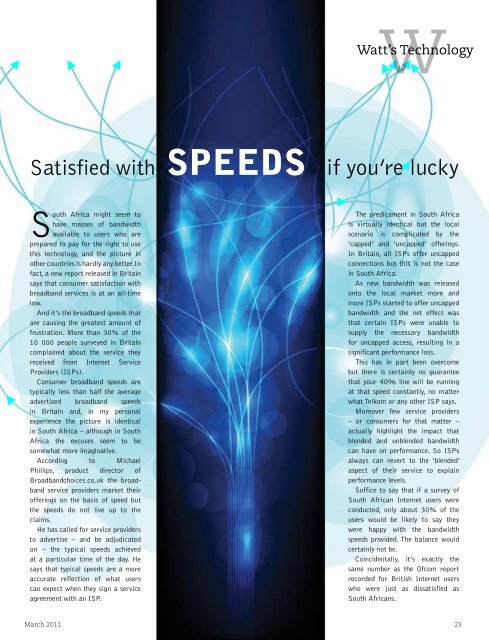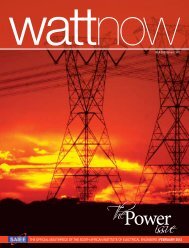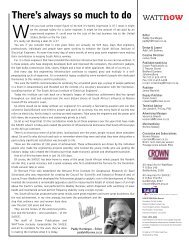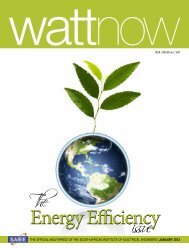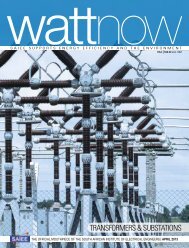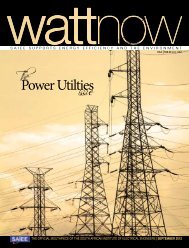download a PDF of the full March 2011 issue - Wattnow
download a PDF of the full March 2011 issue - Wattnow
download a PDF of the full March 2011 issue - Wattnow
- No tags were found...
You also want an ePaper? Increase the reach of your titles
YUMPU automatically turns print PDFs into web optimized ePapers that Google loves.
WWatt’s TechnologyWWatt’s TechnologyWatt’s TechnologySatisfied with speeds if you’re luckySouth Africa might seem tohave masses <strong>of</strong> bandwidthavailable to users who areprepared to pay for <strong>the</strong> right to usethis technology, and <strong>the</strong> picture ino<strong>the</strong>r countries is hardly any better. Infact, a new report released in Britainsays that consumer satisfaction withbroadband services is at an all-timelow.And it’s <strong>the</strong> broadband speeds thatare causing <strong>the</strong> greatest amount <strong>of</strong>frustration. More than 30% <strong>of</strong> <strong>the</strong>10 000 people surveyed in Britaincomplained about <strong>the</strong> service <strong>the</strong>yreceived from Internet ServiceProviders (ISPs).Consumer broadband speeds aretypically less than half <strong>the</strong> averageadvertised broadband speedsin Britain and, in my personalexperience <strong>the</strong> picture is identicalin South Africa – although in SouthAfrica <strong>the</strong> excuses seem to besomewhat more imaginative.According to MichaelPhillips, product director <strong>of</strong>Broadbandchoices.co.uk <strong>the</strong> broadbandservice providers market <strong>the</strong>ir<strong>of</strong>ferings on <strong>the</strong> basis <strong>of</strong> speed but<strong>the</strong> speeds do not live up to <strong>the</strong>claims.He has called for service providersto advertise – and be adjudicatedon – <strong>the</strong> typical speeds achievedat a particular time <strong>of</strong> <strong>the</strong> day. Hesays that typical speeds are a moreaccurate reflection <strong>of</strong> what userscan expect when <strong>the</strong>y sign a serviceagreement with an ISP.The predicament in South Africais virtually identical but <strong>the</strong> localscenario is complicated by <strong>the</strong>‘capped’ and ‘uncapped’ <strong>of</strong>ferings.In Britain, all ISPs <strong>of</strong>fer uncappedconnections but this is not <strong>the</strong> casein South Africa.As new bandwidth was releasedonto <strong>the</strong> local market more andmore ISPs started to <strong>of</strong>fer uncappedbandwidth and <strong>the</strong> net effect wasthat certain ISPs were unable tosupply <strong>the</strong> necessary bandwidthfor uncapped access, resulting in asignificant performance loss.This has in part been overcomebut <strong>the</strong>re is certainly no guaranteethat your 4096 line will be runningat that speed constantly, no matterwhat Telkom or any o<strong>the</strong>r ISP says.Moreover few service providers– or consumers for that matter –actually highlight <strong>the</strong> impact thatblended and unblended bandwidthcan have on performance. So ISPsalways can revert to <strong>the</strong> ‘blended’aspect <strong>of</strong> <strong>the</strong>ir service to explainperformance levels.Suffice to say that if a survey <strong>of</strong>South African Internet users wereconducted, only about 30% <strong>of</strong> <strong>the</strong>users would be likely to say <strong>the</strong>ywere happy with <strong>the</strong> bandwidthspeeds provided. The balance wouldcertainly not be.Coincidentally, it’s exactly <strong>the</strong>same number as <strong>the</strong> Ofcom reportrecorded for British Internet userswho were just as dissatisfied asSouth Africans.<strong>March</strong> 23<strong>2011</strong> 23


